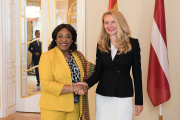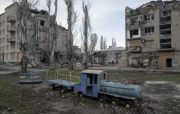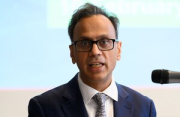
Foreign Secretary James Cleverly gave an oral statement to the House of Commons on the situation in Russia.
Mr Speaker, with permission I will update the House on the situation in Russia.
The long running feud, played out in public, between Yevgeny Prigozhin and his Wagner Group and the leaders of the Russian armed forces reached a peak over the weekend.
On 10 June, Russia’s deputy Defence Minister said that “volunteers” fighting for Russia must sign contracts with the Russian Ministry of Defence by 1 of July. Prighozin announced immediately that his personnel would refuse to do so.
We – along no doubt with many members of this House – had been following closely the open escalation of rhetoric from Prigozhin.
Last Friday, Prigozhin denounced Russia’s military leadership, accusing them of bringing “evil” on the country and invading Ukraine for their own personal benefit. He drove a coach and horses through President Putin’s case for war, saying and I quote:
The war was needed for Shoigu to receive a hero star … The oligarchic clan that rules Russia needed a war.
He then went onto add, and I stress I quote him directly here:
The mentally ill scumbags decided: ‘It’s OK, we’ll throw in a few thousand more Russian men as cannon fodder. They’ll die under artillery fire, but we’ll get what we want.’
In the early hours of Saturday, Wagner forces entered the city of Rostov-on-Don in southern Russia and Prigozhin announced that he would march on Moscow.
This finally drew a response from Putin, who accused Prigozhin of an “armed rebellion” and promised “tough” action and punishment.
Wagner troops promptly advanced more than 500 miles northwards towards Moscow, before Priogozhin abruptly called off his operation and announced that Wagner would return to their bases.
Having condemned him as a traitor in the morning, Putin pardoned Prigozhin in the afternoon when a Kremlin spokesman announced that no charges would be brought.
Mr Speaker, the Government of course considers this an internal Russian affair, and of course the leadership of Russia is a matter exclusively for the Russian people.
But everybody should note that one of Putin’s protegés had publicly destroyed his case for the war in Ukraine.
Prighozin said on Friday, “there was nothing out of the ordinary before the 24 February 2022, the situation was frozen with exchanges of military action and vicious looting by the Russians)”. He also said that Russia’s Defence Ministry is “trying to deceive both the President and the nation … that there was incredible aggression from the Ukrainian side with NATO support ready to attack Russia”.
The Russian government’s lies have been exposed by one of President Putin’s own henchmen.
Now the full story of this weekend’s events and their long-term effects will take some time to become clear. And it is not helpful to speculate.
But Prigozhin’s rebellion is an unprecedented challenge to President Putin’s authority and it is clear that cracks are emerging in the Russian support for the war.
I, of course, hold no candle for Prighozin, or his forces. They have committed atrocities in Ukraine and elsewhere.
But he has said out loud what we have believed since the start of Russia’s full-scale invasion: that this invasion was both unjustified and unprovoked.
The events of this weekend are an unprecedented challenge to Putin’s authority – with an armoured column approaching his own capital city.
As the situation unfolded, the Government monitored and responded to developments carefully. I was briefed on Friday evening, and again regularly throughout the weekend by my officials. On Saturday, I chaired a COBR meeting on the situation.
We also have been in close touch with our Allies. On Saturday I spoke to Secretary Blinken and my other G7 colleagues, and I have also been in touch with other regional partners. My Rt Hon Friend the Prime Minister spoke to President Biden, President Macron and Chancellor Scholz on Saturday afternoon.
Mr Speaker, despite these internal developments in Russia, Putin’s bloody war in Ukraine continues. The Ukrainians fight for their survival, and our Ukrainian friends are mounting a determined counter-offensive and steadily clawing back their territory.
We will not be distracted from our work to support Ukraine’s self-defence and their subsequent recovery.
This weekend’s events show that it is Ukraine and its partners, not Russia, that have the strategic patience and resolve to prevail.
At last week’s Ukraine Recovery Conference, we sent a clear message that not only will we stand by our Ukrainian friends as they resist Putin’s onslaught, but we will stand with them in the subsequent peace as well.
Now that Russia’s leadership cannot justify this war even to each other, the only rightful course is for Putin to withdraw his troops and end this bloodshed now.
Mr Speaker, I commend this statement to the House. Photo by Chris McAndrew, Wikimedia commons.









































